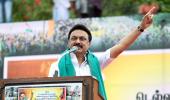Indications are that Modi will have words of encouragement for Stalin, and the meeting is likely to be much less acrimonious than critics of either would want it to be. notes N Sathiya Moorthy.

With Covid conditions coming slowly but surely under check in his state and also the national capital, Tamil Nadu Chief Minister M K Stalin is headed for New Delhi to meet with Prime Minister Narendra Modi and his top ministers for the first time after assuming office.
In Delhi, he is also scheduled to meet with Congress ally's acting head Sonia Gandhi and CPI-M General Secretary Sitaram Yechury, apart from paying courtesy calls on President Ram Nath Kovind and Vice-President Muppavarapu Venkaiah Naidu.
The Dravida Munnetra Kazhagam is planning to give Stalin a huge welcome at Delhi, from the airport on, with Tamil Nadu style wall posters and a possible cut-out or two, making it an 'arrival statement' of sorts for the leader, who has waited patiently for decades before making it on his own, three years after his popular father M Karunanidhi's death.
Patience will also be Stalin's watch-word when he calls on Modi, Home Minister Amit Shah, Finance Minister Nirmala Sitharaman and Industry Minister Piyush Goyal among others -- and he has displayed a lot of restraint through his first month in office, making even sworn critics of his father and his party to pause, look up and take notice.
Accompanied by Irrigation Minister S Duraimurugan, who is also the DMK's octogenarian general secretary, and Chief Secretary V Irai Anbu, Stalin's first meeting with Modi by itself is an event to watch and take note of.
The PM is dispatching one of his security-cleared vehicles to pick up Stalin from Tamil Nadu House for their June 17 meeting. It is an honour successive prime ministers have reserved for Karunanidhi and his rival, All India Anna DMK leader J Jayalalithaa.
Indications are that Modi will have words of encouragement for Stalin, and the meeting is likely to be much less acrimonious than critics of either would want it to be. He is expected to give Stalin a patient hearing, especially on demands and/requests for Covid vaccines and other pandemic assistance, plus clearance of pending GST dues, which stood at Rs 20,000 crores (Rs 200 billion) as far back as January (when the AIADMK government was in power).
Be it as it may, there are issues and issues where the ideological differences between their two parties, and their own styles of functioning are likely to clash -- and they cannot but avoid touching upon at least some of them.
Starting with adding the sub-head 'Dravidian' to his personal Twitter account the minute he became CM, Stalin has been reiterating his party's known position on pan-Tamil issues and what have also remained the state's concerns through the past years.
The Bharatiya Janata Party-ruled Centre had a better working relationship with Edappadi K Palaniswami's AIADMK government. So, Modi and his top party aides would have to decide how to handle such issues under a new 'Dravidian' dispensation, which had sent out their position loud and clear for distant Delhi to hear through the past month when Stalin was tied down to pandemic relief work, even before he formally assumed office.
Having left it mostly to his ministerial aides to handle most departmental issues initially, Stalin, like his Dravidian predecessors, began writing to Modi directly, at times short-cutting other central ministers in charge of some of these issues.
It was meant to cut short red-tapism originally, but under Jayalalithaa as chief minister, it became a political message in its own way -- whatever the outcome of the individual missives.
The latest missive seeks the PM's intervention to cancel the reported revival of the Centre's attempts for hydrocarbon exploration and extraction in the Cauvery delta, which according to local farmers will hit their livelihood more than already.
Simultaneously, both farmers and environmentalists have also been arguing on the ironical situation in which millions of litres of extracted ground water too will be going waste, even if a part of it is stored in a pre-planned manner for drinking and irrigation water needs.
Centre-state strains have also appeared on the NEET front, the DMK having led the 'Tamils opposition' to the national-level exams for all medical admissions, on the orders of the Supreme Court. Stalin has already written to Modi on this, too.
His visit is also being heralded by the state government appointing a multi-member committee to study the pros and cons of NEET, for future reference. The panel chair, retired Madras high court judge A K Rajan, used to be a favourite of Stalin's late father Karunanidhi as chief minister, for chairing such other panels under the Commissions of Inquiry Act.
Interestingly, another lurking topic for discussion, whether or not it may come up, is the Stalin government's decision to refer to the central government as onriya arasu, reiterating the Constitutional position, 'Union of States' or the 'Union of India', in letter and spirit.
The Tamil translations of the statements and missives in English have begun using the term, though in English the term, 'Government of India' continues without hindrance.
It all relates to the DMK's decades-old strong belief, which is also reflected by other anti-BJP states and parties now, on 'federalism'. Flowing from that belief is also the allegation that under Modi's premiership, the Centre has been usurping federal powers of the states without even by way of leave.
Both Karunanidhi and his political mentor, DMK founder C N Annadurai, were strong proponents of the federal cause especially after the party giving up the 'separatist' demand and identity as far back as 1960 (and not two years later, as is often propagated, for fear of Defence of India Rules, during the Chinese aggression, 1962).
'Maanilathil suyatchi, matthiyil kootatchi' was Karunanidhi's slogan and solution for the federal issue, meaning, 'Self-rule in state(s), coalition at the Centre'.
During his second term as chief minister in the 1970s, Karunanidhi also set an unbroken precedent when he appointed a commission under retired high court chief justice P V Rajamannar to study the federal question and delineate the Constitutional powers of the state.
Such being the case, at a time when pan-Tamil revivalism is sneaking into the body politic after decades, the Centre as an institution or the BJP as a party misconstruing the DMK demand could lead to more problems than solutions.
And solutions to such issues can be found only through a national discourse, in forgotten fora like the National Integration Council and the like.
It is also in this context that the DMK and successive AIADMK governments before Stalin have been pressing the Centre and the President for early freedom to the seven individuals convicted in the Rajiv Gandhi assassination case who completed 30 years in prison this month.
It is not about the legality of it, but about the politics of it all. Taken in the right direction a favourable decision can deny pan-Tamil peripheral groups rearing their heads as they have made it a huge issue through the past decades.
With Finance Minister Sitharaman, Stalin is going to press the state's continual demand (from the previous AIADMK days) for releasing the GST dues, and also allotting more funds for the state -- and not to 'punish developed states' for being developed.
With Home Minister Amit Shah, Stalin may take up the release of the Rajiv killers, sidestepping the issue while paying a courtesy call on President Kovind.
Yet, it will be interesting to know if the BJP ministers at the Centre have any good word to be shared with Stalin personally, on his handling of the Covid pandemic, and more so the sensitive issue of temple administration in the state.
Even before the DMK came to power and through the past three-plus years when the state was on election mode, BJP-centric Hindutva social media groups have been taunting the Stalin leadership on the government takeover of all Hindu temples, and wanting them to be 'freed' especially from the hands of 'non-believers', a reference only to the DMK and not the AIADMK.
Possibly egged on by his wife Durga, a strong believer and a staunch follower of astrology, the chief minister seems to have given priority to regularising temple administration even at the height of the pandemic work, which remains on the top of the state government's agenda and his own.
Thus, his chosen minister for temple administration, P K Sekar Babu, lost no time in putting up the list of properties of government-owned temples on the official Web site. As the wag exclaimed, at around Rs 3.5 lakh crores, Tamil Nadu's temples might be among the single largest property-holders in the state.
Babu has since got around to getting temple property in Chennai cleared of squatters. The process will continue, going beyond the Jayalalithaa government's attempt at naming-and-shaming the defaulters by putting out their names in respective temples with the due amounts against each one's name.
However, in seeking to revisit the issue of temple property, to manage which alone the Justice Party government had taken them over a hundred years ago, the ruling DMK has also been drawing the line in terms of enforcing the party's favourite social justice theme.
Barring anti-DMK social media groups identified with select Hindutva groups, Babu's reiteration of the Karunanidhi era policy of appointing non-Brahmin priests has not faced criticism from other quarters. The minister has also talked about appointing women as temple priests.
Though seen mostly as a social issue with political overtones, this could be among the defining moment in BJP-DMK relations through the coming years, up to election 2024 and beyond.
Though it is too early to predict, going by the current trends, it is not unlikely that Stalin's DMK could simply hijack the BJP's religion-centric politics in the state, which anyway has not fetched the latter more than 2.5-3 per cent vote-share in the best of times.
A pointer to how the BJP views Stalin's temple initiative may be known during the chief minister's meetings in Delhi, though it cannot lead to a new alliance in the offing.
Of course, the PM is not unlikely to flash the BJP's desire to see the DMK chart its own course and away from the Congress rival, one more time -- especially if and when the two leaders meet one-on-one without aides, on Friday the 18th.










